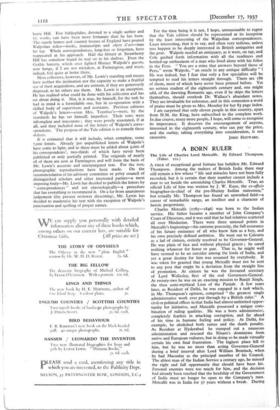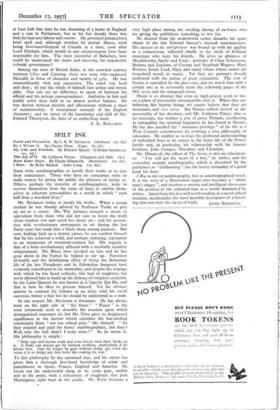A BORN RULER The Life of Charles Lord Metcalfe. By
Edward Thompson. (Faber. 21S.) The Life of Charles Lord Metcalfe. By Edward Thompson. (Faber. 21S.) A PIECE of exceptional good fortune has befallen Mr. Edward Thompson. Among the makers of British India there may still remain a few whose " life and miracles have not been fully recorded, but it is certain that their number cannot include a man to set beside the astonishing Charles Metcalfe. True, an official Life of him was written by J. W. Kaye, the ex-officio biographer-in-chief of the pre-Mutiny Indian statesmen," but actually Mr. Thompson has found an unworked field—a career of remarkable range, an intellect and a character of heroic proportions.
Charles Metcalfe (1785-5846) was born to the Indian service. His father became a member of John Company's Court of Directors, and it was said that he had relatives scattered all over Hindustan. There were three unusual points in Metcalfe's beginnings—his extreme precocity, the full assurance of his future eminence of all who knew him as a boy, and his own precisely defined ambition. He went out to Calcutta as a lad of sixteen, entirely resolved to be Governor-General. He was plain of face and without physical graces ; he cared nothing whatever for horse or gun. That is, he might well have seemed to be an outsider among the lords of India, and yet a great destiny for him was assumed by everybody. It was taken for granted that young Metcalfe must not be sent to any post that might be a deviation from the straight line of promotion. At sixteen he was the favoured secretary of Lord Wellesley, first of the real Governors-General. At twenty-two he was on an exacting mission to Ranjit Singh, the then semi-mythical Lion of the Punjab. A few years later, as Resident of Delhi, he was engaged in a task which, in Mr. Thompson's opinion, comprised " the greatest single administrative work ever put through by a British ruler." A civil or political officer in that India had almost unlimited oppor= tunity for initiative, and Metcalfe possessed a unique com- bination of ruling qualities. He was a born administrator, completely fearless in attacking corruption, and far ahead of his time in humane feeling and policy. At Delhi, for example, he abolished both suttee and the death penalty.
As Resident at Hyderabad he stamped out a nauseous administration and rescued the Nizam's dominions from native and European vultures, but in doing so he made virtually certain his own final frustration. The highest place fell to him, but he was no more than acting Governor-General during a brief interval after Lord William Bentinck, when he had Macaulay as the principal member of his Council.
The ablest man of the Indian Service a century ago, he missed the right and full opportunity that should have been his.
Personal enemies were too much for him, and the decision had already been reached that the headship of the Government of India must no longer be open to the Company's men. Metcalfe was in India for 37 years without a break. During
at least half that time he was dreaming of a home in England and a seat in Parliament, but in his last 'decade there was little for him save labour and sorrow. He gmterned Jamaica for a brief spell and, although stricken by mortal illness, tried being Governor-General of Canada at a time, soon after Lord Durham, which would in any circumstances have been impossible for him. The most masterful of Bahadurs, how could he Understand the claim, and necessity, for responsible colonial government ?
Among the men of British India, in the crowded century between Clive and Canning, there was none who surpassed Metcalfe in force of character and variety of gifts. He was extraordinarily vital and expressive. His mind was hard and clear ; he put the whole of himself into action and words alike. One can see no difference to speak of between his official and his private correspondence. Ambition in him and Public spirit were held in an almost perfect balance. He was devout without pietism and affectionate without a trace of sentimentality. A triumphant example of the English character ; and by virtue of the knowledge and skill of Mr. Edward Thompson, the hero of an enthralling book.
S. K. RATCLIFFE.















































 Previous page
Previous page